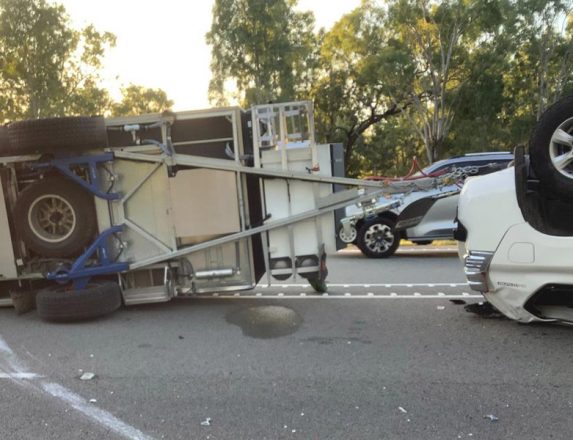The number of caravan crashes on Australian roads seems to be on the rise, and one group more qualified than most to offer an opinion on why this is so are the tow truck drivers who almost weekly attend a scene of highway carnage.
The team at Clayton’s Towing on Queensland’s Sunshine Coast has literally seen the aftermath of hundreds of caravan rollovers. A while back, general manager, Mike Clayton, told the Grey Nomads that the ‘towies’ had noticed a number of recurring themes.
“With each crash, as we a have interest in caravanning, we look at what we think caused it and often chat to the drivers about their experiences and what they did,” he said. “We look how they set their van up, and how different vans are manufactured.”

The caravan rolled near Cromarty on the Bruce Highway. PIC: Queensland Police Service
Mr Clayton stresses that his personal views were not formed in reaction to one particular caravan crash, but rather from an overview of potential contributing causes in multiple incidents.
“Firstly, there is no doubt the heavier towing vehicle is, the better,” he said. “Just because it says on paper that a vehicle can tow 3.5-tonne it doesn’t mean you’re going to be all good to tow even a 2.5-tonne van.”
Mr Clayton is also seriously concerned that some grey nomads don’t realise the importance of having the weight in their van correctly distributed … and warns it isn’t as simple as hooking up and hitting the road.
“It actually needs weight at the front loaded up to be safer and a lot of these caravans have got limited table weight,” he said. “Which is why they get this fishtail happening and then it’s all over.”
Mr Clayton urges travellers to buy a tow ball weight scale and check the weight, as well as taking note of where items are in the van and what water levels are sitting at.
“Lots of caravans we collect after accidents – when they stay together – we do see evenly balanced with the tow bar up in the air, or are able to pick the drawbar up with one hand,” he said. “This is a recipe for disaster and we consider the biggest factor for a lot of crashes we attend.”
Mr Clayton believes that better education could lead to a dramatic reduction in caravan accidents, and has previously suggested online courses with a certificate issued, rather than a special caravanning licence.
Of course, local conditions are another contributory factory in many accidents.
Mr Clayton says that around the Nambour area where he is based there are a lot of sections of highway that are downhill, with slight bends, and with some cross winds involved.
“In real terms with the number of caravans on the road there are no more crashes than other vehicles,” he said. “But the mess and disruption, as well as stress they cause as they are often people’s homes, puts them in the limelight.”